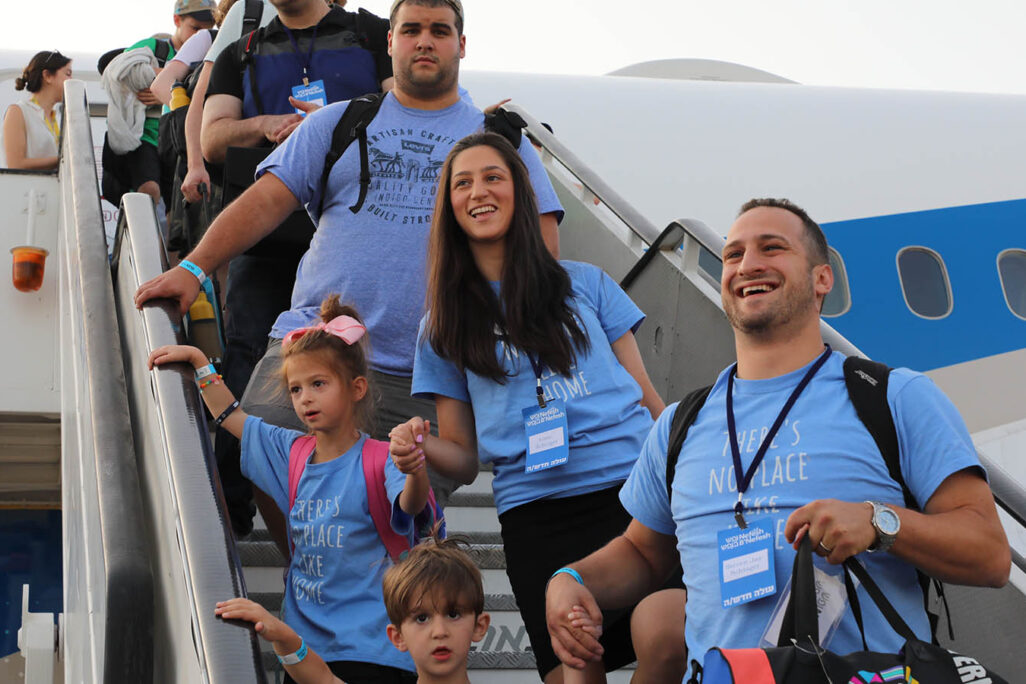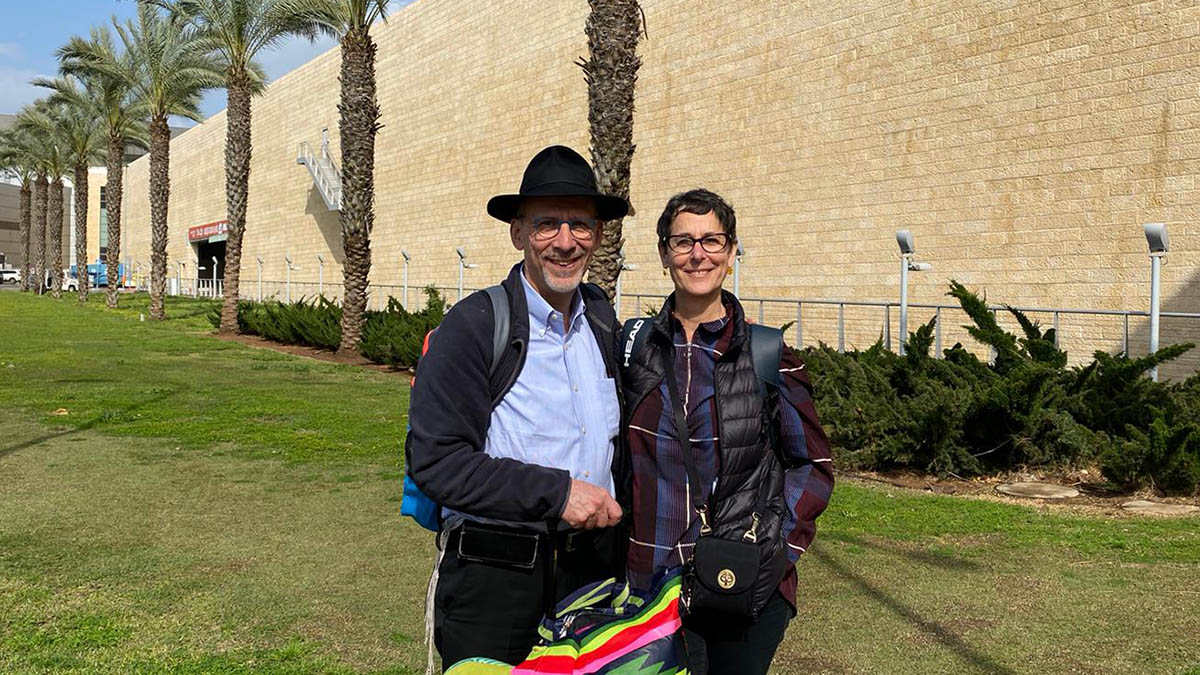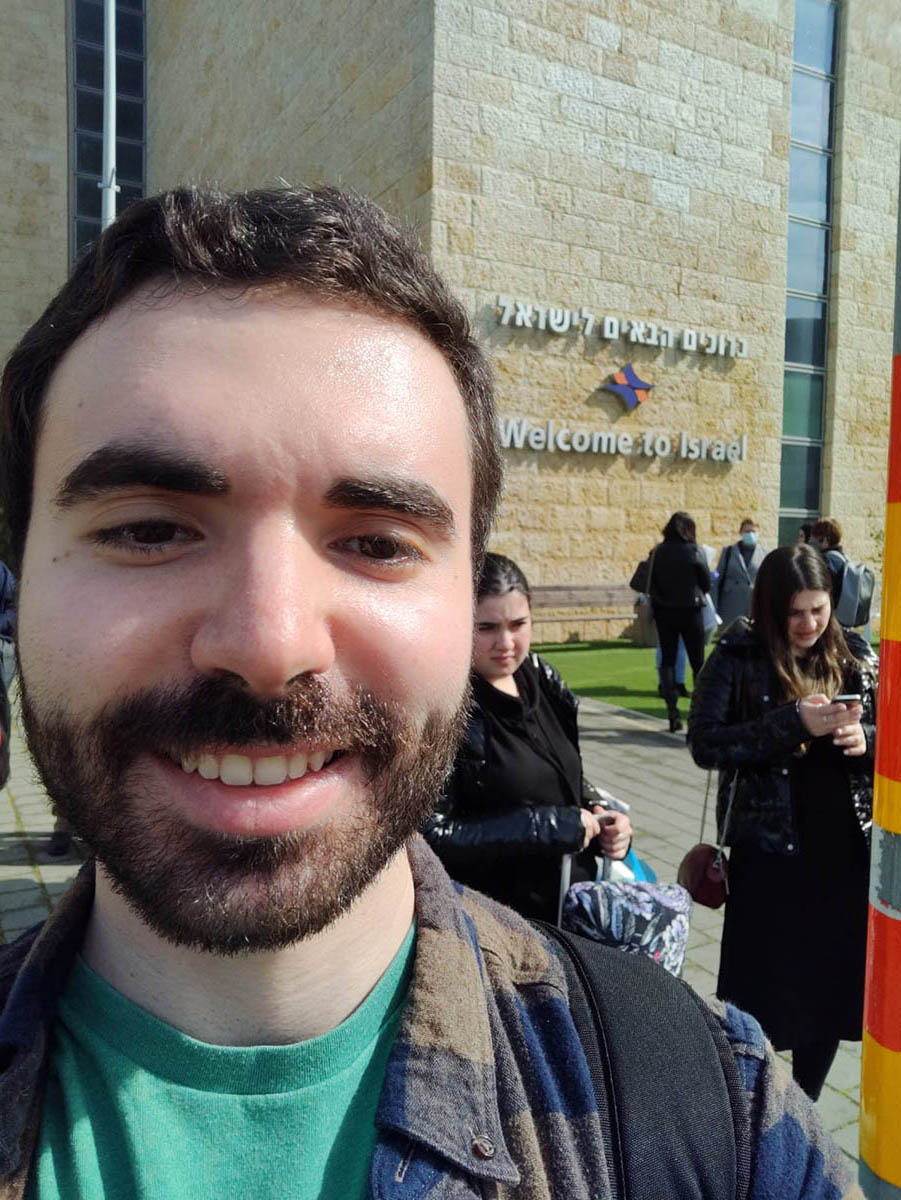
At the heart of the world-wide corona crisis, 50 new immigrants from the United States will arrive in Israel by the end of the month. Alec Jaffe and Karen and David Weinsein decided to immigrate to Israel long ago. However, they did not plan their immigration date to coincide with the pandemic outbreak in both New York and Israel which only accentuates the gravity of their choice. Through the Nefesh B'Nefesh organization, which assists new immigrants in moving to Israel, they landed at Ben Gurion Airport last Thursday to begin their new lives between the four walls of isolation.
"We wanted to be close to our granddaughter," says Karen Weinstein (67), who immigrated from Queens, New York, with her husband David (68). "We were fortunate. We arrived in Israel during the fall and were able to make all the arrangements during this time, including buying an apartment and preparing for the move."
The Weinsteins, who have recently retired, have been in self-quarantine for a few days in their home in Raanana. Keren is a graphic designer, and David worked at a diamond grading lab in New York. Their daughter immigrated to Israel seven years ago, got married, and currently lives not far from them with her husband and young daughter, who was born several months ago.
I think because of Israel's size, and its political situation – There is a higher level of commitment here to 'us'. People realize that they are part of a small collective in a small piece of land
"We started sending our stuff from our home in Queens to Israel this last month and managed to sell most of what was left and the rest we gave away. All that we have left now back in Queens is our car, which we couldn't sell," says Karen. They have been making the arrangements and plans for immigration for over a year, but they have not been afraid to postpone the immigration, and even more – they feel that they have come just in time. "We were very lucky," says Karen. "We arranged our immigration plans over time, and it turns out that we were amazingly accurate and lucky, as we left just a minute before the situation broke out and erupted in New York."

"We were so caught up in the transition that we didn't even stop to think about the situation," says David, explaining that the past month has been particularly tricky because of the endless dealings with the immigration process, so the Weinsteins had little time to dwell on the news. "Nobody could have imagined that things would develop this way," says Karen. "Now we look at everything happening in retrospect and understand the magnitude of the matter. A city of 15 million people is completely closed."
"We sold the house, and we had to clean it up and leave it a few days before the flight. At the same time, we hoped that we would be able to board the Nefesh B'Nefesh flight to Israel," David continues. "Only in the last week did we get the visa for immigration and the flight was booked. For the last few days we lived with our friends and ordered takeout as the city shut down right before our eyes."
Keren and David's son is still in New York, and they say he is doing well. He works for a company that develops games and continues to work from home, so Karen and David don't feel worried about him. "He says the situation has helped develop his sense of creativity, and it has given him new ideas for his work – he now has all the time in the world for creativity," laughs David.
"Our friends threw us a farewell party. Rather, a series of farewell parties," says David. "There were farewells from our friends and neighbors in our home. My parting party from work, which should have been last Monday, two days before we left, had to be canceled. The situation got worse day by day, and in the end, I decided that because of the situation and the risk, I didn't want people to gather at work."
Despite, and perhaps because of all of the work related to the transition, Karen and David are taking the isolation well. "We feel that we can finally rest," says Karen. "After such a terrible month of packing, cleaning, folding, all the bureaucracy of moving and arriving in the country – this isolation is really like a vacation," says David. "We have been married for 34 years, and we feel that we are now on a honeymoon again. It is as if we left the chuppah again for 14 days. It is really nice to get up every morning, eat, rest, and not have to go anywhere."
"It would have been nice if we could go outside, but given the circumstances, we're fine with staying inside," Karen adds. "The neighbors are very kind, they have been bringing us food and wine, and we even got to see our granddaughter for the first time, from two meters distance of course. And that's fine, compared to the 10,000 kilometers that separated us until now."
Karen and David don't have a television yet, and just yesterday they got connected to the internet, so they are still not completely on top of what's going on around. "That's fine with us," laughs Karen. "We are in no hurry to tune in to the news, and it is clear that we do not know the situation in Israel, but it is certainly not simple."
"My heart is with the people that this situation has caused havoc," Karen adds. "We can only imagine, and even partially, the number of people who are left without work. Our daughter works all day from her apartment now, her husband works from home as well, and they have a four-month-old girl who just wants their attention. They are exhausted because there are very few things one can do in such a small space. But I know that there are hundreds of thousands of Israelis in a much worse situation and are worried about their future. "
"I don't have much experience with the Israeli government, but I find it hard to imagine that there are more compassionate people than the Israelis. It's part of their DNA," David concludes. "I think because of Israel's size, and its political situation, there is a higher level of commitment here to 'us.' People realize that they are part of a small collective in a small piece of land. In the USA, it's the 'home of the free and the brave,' so everyone does what they want. In Israel, people have more connection with each other, which is why we wanted to come here.”
It's not the end of the world
Alec Jaffe, 24, comes from a boring little suburb, as he describes it, near New York City. He has planned his immigration for over a year and a half, and although his parents asked him to postpone it due to the situation, he insisted on moving anyway. "I couldn't wait any longer. I want to start my new life in Israel," he says.

For the past two years, Jaffe has worked in the block-chain and tech finance industry, which he says is one of the main reasons why he decided to move. "I am still working in the field, and my partners and I are about to launch a new software next month. The block-chain community in Israel is much more extensive than I have ever encountered in the big American cities," he explains.
"The US administration controls the virus outbreak much less successfully than Israel," notes Jaffe, who says that in recent days New York and New Jersey, between which he has spent his life, have become the focus of a mass outbreak that has made it an emergency area, alarming residents. "In fact, I feel much safer about being here than in the US because of the rapid and wide-ranging response the Israeli government is taking. I don't worry about my family because they are healthy, and they can get quality health care if they need it."
Since arriving in Israel, he has been in self-quarantine in a friend's apartment he met online before immigrating. "We have already met once on a trip I did before immigrating a few months ago, and we are getting along great," he says. He lives in Holon in his friend's parent's apartment, and despite the confusion surrounding the rise in the epidemic, he feels safe and optimistic. "My friend's parents came from Ukraine, and they have hosted me exceptionally well so far. They have made me feel very much at home. Maybe it has to do with the fact that they were new immigrants themselves," says Jaffe.
"In quarantine, I spend time with my friend and his family while I run my business online. Afterward, I don’t plan to do anything different from my original plan: to look for an apartment in the Tel Aviv area and after the epidemic passes, subscribe to a gym. I think things will return to normal over time. In the end, it's not the end of the world," he continues.
They keep coming
"In the light of the complex global circumstances of recent times, it is amazing to see the continuation of the immigration process," says Rabbi Yehoshua Fess, founder and CEO of Nefesh B'Nefesh, last Thursday after the landing of the "Corona immigration" plane. "These new immigrants represent the strong future of the State of Israel. They come here full of determination to fulfill their Zionist dream of living in the Land of Israel."
Nefesh B'Nefesh has allocated a call center for new immigrants, which will enable the organization to stay as close as possible and provide immigrants with the necessary support and even allocate special budgets to provide additional assistance if needed.






